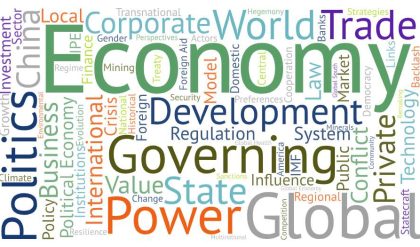The notion of a comprehensive social vision is rootcd in a time when intellectual leaders were expected to be generalists and because of the state of social inquiry, could justifiably claim to be just that. Ironically, it was Adam Smith, the man who impressed on economic thought the progreSSive nature of specialisation, who also exemplified this spirit of broad endeavour. If Smith’s reputation now rests with the “Wealth of Nations· (1776), it was first made with “The Theory of Moral Sentiments· (1759). Furthermore, he intended to complete his scheme with an ambitious review of forms of government throughout history. In this way he would have posited a closed theory of society, embracing a philosophical/ethical consideration of man in the social state, an account of the organisation of economic relations and a guide to the principles of good government.
It is this huge synthetic exercise, rather than anyone piece of economic analysis which some would sec as guaranteeing Smith’s place as a great, perhaps the first, social scientist.(2) In much the same way the mind of John Stuart Mm could encompass philosophy (both moral and political) and economics and attempt to weld them into a coherent intellcctual entity, which has a major influence on liberal democracies to this day. The relevant works in this case are “On Liberty· (1859), “Principles of Political Economy· (1848), and “Considerations on Representative Government” (1861) . These two thinkers are often pitted against Marx In terms of cconomic substance and political prescription. Certainly Marx: used Smith to understand what Capitalism said about itself, in order to attack it.
“In particular, an economics that includes !!n adequate analysis of government action and of the mechanisms and prevailing philosophies of political life is likely to bc much more satisfactory to the beginner than an array of different sciences which he does not known how to co·ordinate -whereas to his delight, he finds precisely what he seeks ready- made in Karl Marx.·
The contributions of many individual economists of our own times owe a lot to the influences of the capitalist Smith, the libcral Mill and/or Marx. In the same way that a natural scicntist hoping to advance a programme of research must start by acccpting a set of fundamental principles already cstablished, economists explicitly and implicitly build on the accumulated ‘work of others. This may take the form of pragmatically accepting empirical results, analytic devices, or most importantly in this context value judgements. Some however reject as sterile the resulting mass of specialised results and wish to start again with a social vision – or in Kuhn’s terminology, shift the paradigm. Although in very recent times none has achieved the status of the three mentioned above, a few have been credited with (or accused oJ) maktng the attempt. One such is Galbraith.
In a typical passage, this maverick laments and ridicules specialisation; on expecting at the University of California to meet experts on agricultural economics or even fruit prices, he discovers economists who domain is rcstricted to prune prices. lIe comments thus: . “They would have been less useful if exposed to more cosmic questions or even diversified to artichokes.” Galbraith makes his real point later in the same piece: •…. at least in the social sciences, specialisation is also a source of error …. The world to its discredit does not dividc neatly along the lines that separate the specialists. “[5] Galbraith’s theory extends over psychology, political communication, macroeconomics and industrial organisation.
He is grouped by Bruno Frey with a number of others such as Veblen, Myrdal and Kaldor as reprcsentlng the ‘Unorthodox” tradilion. Significantly for these purposes, one of thc elements which Frey sees as uniting these individuals is that they see the economy as part of a socio-cultural system and so as understandable only in a trans-disciplinary way. [6] The preceding has attempted to link an admittedly diverse group, That link is simple, but not trivial . the debate between these traditions has occupied human minds and motivated human aetions to an enormous extent. As against this, this debate can become entirely unstructured, and often is dominated by ideology run riot at worst and essentially normative disputes at best. Modern welfare economics is sometiIlles seen as rescuing political economy from endless normative conflict and the next section outlines some of the issues raised thereby.
The first two fundamental theorcms of welfarc cconomics establish the Par~to optimality of compeUlive cquilibrium and the possibility of moving to any desired equilibrium by appropriate lump-sum transfer payments. This essentially abstract construct has provided the framcwork for a debate which is central to political economy: the role and extent of government intervention in the economy. Statc action is scen as correcting for market failure i.e. the breakdown of the model”s assumptions and so can be advocated on an apparently pragmatic case-by-casc basis.[7] However. since questions of distribution arise. the scheme is substantially complicated. A number of compensation criteria/measures of welfare changes have been advanced and critically examined (e.g. Marshallian consumers· surplus. Hicks and Kaldor criteria). The necessity of a social decision still remains and in this context the tradition from Condorcet to Arrow becomes relevant. Thus the third thcorem shows that undcr certain weak assumptions. thcre is no logically infallible way of aggregating the preferences of diverse individuals. Sketched this way. welfare economics may scem to the political cconomist as no more than a litany of negative results. Feldrnan exprcsses this feeling as follows:
‘We fecI we know. as Adam Smith knew. which poliCieS would increase the wcalth of nations. But because of all our theoretic goblins. we can no longer prove it. “Nevertheless. political economics will probably continue to refer and defer to this body of work. for a number of reasons. As to the previous point. proven negative results act as brakes on over-ambitious system-builders. Thus for exmnple. the modern literature of political economics often specifies objective functions. which are social welfare functions in disguise. and so make implicit assumptions about Individual preferences which mayor may not be justified. Welfare economics provides secure micro-foundations for societal analysis which arc more coherent than the highly aggregated concepts used in most variants of macrocconomics. Also. results and insights from public choice theory can be incorporated into politko-economic models (e.g. optimal tax policy. public good provision) to provide a benchmark form which to evaluate the actual behaviour of government institutions. Above all. welfare economics is. as Little says. a ‘ealculus with an ethical interpretation ‘.[9] The problem of separating value judgements from scientific statements. recognised by Hume·s Law • whkh has ensured welfare economics is both mathematical and philosophkal also informs political economics.






Comments are closed.